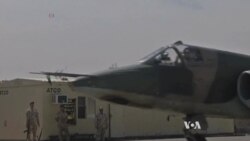Iraqi special forces on Thursday surrounded the city of Tikrit as U.S.-led coalition airstrikes worked to take out Islamic State targets.
“They have Tikrit essentially encircled," said Pentagon spokesman Col. Steve Warren. "They are in pre-combat, ready-to-move positions around the city.”
The Pentagon, which on Wednesday classified the offensive as “stalled,” is now eagerly supporting the battle. So what's the reason for the change?
General Lloyd Austin, who oversees U.S. operations in Iraq, told the Senate on Thursday that the U.S. military had highlighted a number of preconditions to be met before the U.S. would join the fight for Tikrit.
“Once those conditions were met, which included Sh'iite militias not being involved, then we were able to proceed,” he said.
Austin said the forces originally fighting for Tikrit did not have a coherent plan of attack or an organized command and control system.
“These forces obviously were not being controlled by the government of Iraq,” he said.
The general said the operation had a greater chance for success, now that Iraq was leading the fight with U.S. air support.
Tikrit is the capital of Salahuddin province, an area located between the capital, Baghdad, and Iraq's second-largest city of Mosul that has been controlled by Islamic State fighters since June.
The U.S. military also announced Thursday that Iraqi forces had defeated four separate IS attacks across Iraq earlier in the week. It said the Iraqis carried out successful counterattacks on March 24 in the areas of Kisik, western Kirkuk, Bayji and Habbaniyah.
"The tables are turning," said Col. Wayne Marotto, a spokesman for the U.S.-led coalition. The Iraqi special forces are "gaining ground, and their capabilities continue to improve."





